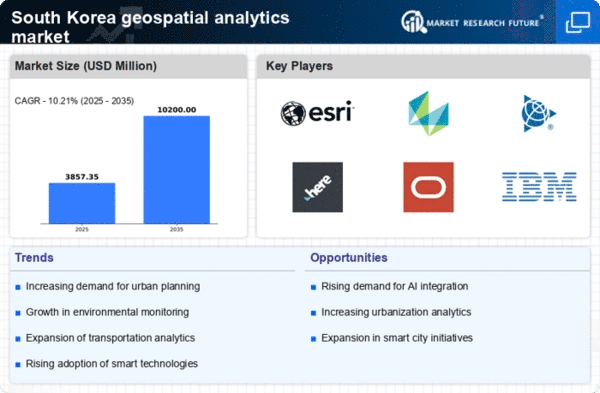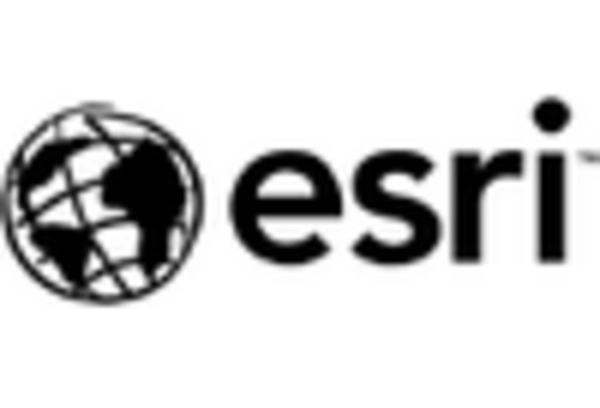The geospatial analytics market in South Korea is characterized by a dynamic competitive landscape, driven by rapid technological advancements and increasing demand for location-based services. Key players such as Esri (US), Hexagon (SE), and Trimble (US) are strategically positioned to leverage their innovative capabilities and extensive product portfolios. Esri (US) focuses on enhancing its geographic information system (GIS) solutions, while Hexagon (SE) emphasizes smart digital realities through its advanced sensor technologies. Trimble (US) is actively pursuing partnerships to expand its reach in the construction and agriculture sectors, indicating a trend towards sector-specific solutions that cater to diverse market needs. Collectively, these strategies contribute to a competitive environment that is increasingly oriented towards innovation and tailored offerings.
In terms of business tactics, companies are localizing their operations to better serve the South Korean market, optimizing supply chains to enhance efficiency. The competitive structure appears moderately fragmented, with several players vying for market share. However, the influence of major companies is substantial, as they set benchmarks for technological advancements and service quality. This competitive interplay fosters an environment where smaller firms may struggle to keep pace, yet also encourages innovation as they seek to differentiate themselves.
In October 2025, Esri (US) announced a partnership with a leading South Korean telecommunications company to integrate advanced GIS capabilities into smart city initiatives. This collaboration is strategically significant as it positions Esri (US) at the forefront of urban development projects, potentially enhancing its market share in the rapidly growing smart city sector. The integration of GIS technology into urban planning is likely to streamline processes and improve decision-making for city planners.
In September 2025, Hexagon (SE) launched a new suite of geospatial analytics tools tailored for the manufacturing sector, focusing on real-time data processing and analytics. This move underscores Hexagon's (SE) commitment to innovation and its strategy to penetrate niche markets. By providing specialized solutions, Hexagon (SE) may enhance its competitive edge and attract clients seeking to optimize their manufacturing processes through data-driven insights.
In August 2025, Trimble (US) expanded its partnership with a prominent agricultural technology firm to enhance precision farming solutions. This strategic action reflects Trimble's (US) focus on integrating geospatial analytics with agricultural practices, potentially leading to improved crop yields and resource management. Such collaborations are indicative of a broader trend towards sector-specific applications of geospatial technologies, which may redefine competitive dynamics in the market.
As of November 2025, the competitive trends in the geospatial analytics market are increasingly shaped by digitalization, sustainability, and the integration of artificial intelligence (AI). Strategic alliances are becoming more prevalent, as companies recognize the value of collaboration in driving innovation and expanding their service offerings. Looking ahead, competitive differentiation is likely to evolve, with a shift from price-based competition to a focus on technological innovation, reliability in supply chains, and the ability to deliver tailored solutions that meet the specific needs of diverse industries.

















Leave a Comment